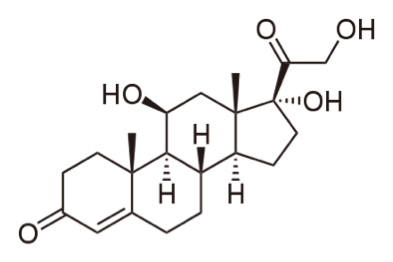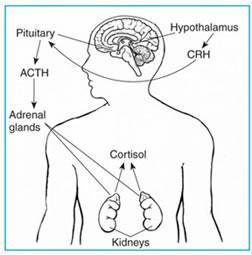Glucocorticoids (gc) and Cortisol
Glucocorticoids (GC) are steroid hormones produced by the adrenal gland that bind to the glucocorticoid recpetor (GR), which is present in almost all human cells. Glucocorticoids are produced in response to stimulation of the adrenal cortex by the hormone Adrenocorticotropic (ACTH). ACTH is produced in the pituitary gland. Cortisol (hydrocortisone) is the most important Glucocorticoid in humans. Cortisol is a steroid hormone that increases blood pressure and blood sugar and reduces immune responses. Cortisol is often referred to as the ‘stress’ hormone because it is released in response to stress and anxiety.


Addison's Disease
Addison’s disease is also known as Chronic Adrenal Insufficiency. This disorder is characterized by a severe lack of production of steroid hormones by the adrenal gland. There are three ways in which the condition may arise; the destruction of the adrenal gland, an inability of the gland to produce cortisol, or genetic disorders where the glands have not formed properly. The adrenal gland produces glucocorticoids. Dysfunction or damage of the adrenal gland may result in little to no production of the glucocorticoid steroid hormones that aid the body in handling stress. Symptoms of Addison’s disease include: fatigue, anxiety, muscle weakness, muscle pain, changes in mood and personality and sudden drops in blood pressure.
Interesting Notes
Adrenocorticotropic hormone (ACTH) is a polypeptide tropic hormone produced by the pituitary gland that regulates Glucocorticoid hormone release. ACTH stimulates the production of Glucocorticoids (GC) in the adrenal gland. People with Addison’s disease often have high plasma ACTH levels which causes pigment-producing cells in the skin to darken scars, skin folds, and mucous membranes. The hyperpigmentation of the skin is due to overstimulation of the ACTH production. ACTH shares a precursor with MSH and thus an increased production of ACTH will result in an increased secretion of MSH as well.
Addison’s Disease is treated by replacing missing hormones with synthetic supplements. A daily dose of hydrocortisone is given to help boost glucocorticoid levels in the body. Additional higher doses of cortisol are also necessary if the body is under any undue stresses whether physically (for examples sickness) or mentally (for example deadlines at work).
Bibliography
http://endocrine.niddk.nih.gov/pubs/addison/addison.htm
http://jcem.endojournals.org (Effects of Cortisol on Carbohydrate, Lipid, and Protein Metabolism; Studies of Acute Cortisol withdrawal in Adrenocortical Failure)
